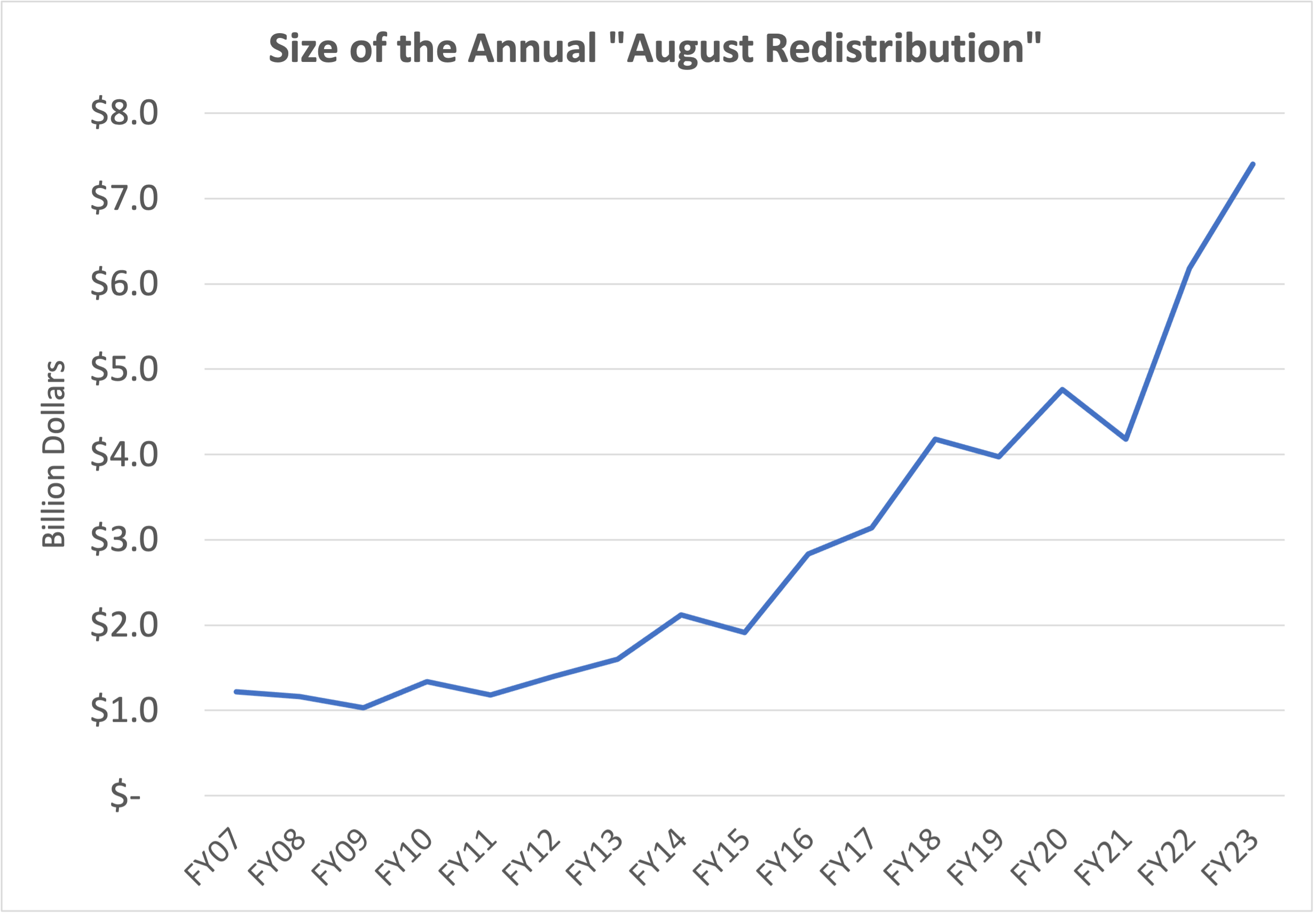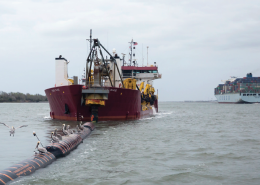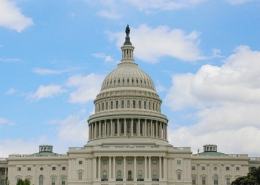As ETW reported five months ago, the Federal Highway Administration told Congress earlier this year that they had discovered a $3.5 billion accounting discrepancy that threatened to possibly force the cancelation of that amount of contract authority held by the 50 state DOTs (and the District of Columbia), pending further investigation. That investigation has now resolved $2.5 billion of that total discrepancy, and states are now being allowed to obligate that money.
The discrepancy was between two different computer systems and their recorded totals of the amount of unobligated contract authority held by the states that was created prior to the enactment of the Infrastructure Investment and Jobs Act (IIJA) in November 2021.
FMIS – the FHWA’s grant management software used cooperatively with state DOTs to record the contract authority distributed to states by program, and the disposition of that contract authority – recorded that states collectively held pre-IIJA contract authority that totaled $3.5 billion more than the total recorded in Delphi (the USDOT accounting computing system that is linked with the Treasury Department and Office of Management and Budget computers that produce the federal budget and the official statements of outlays and balances).
If a discrepancy between FMIS and Delphi cannot be resolved, then Delphi (the one that gets audited annually and which is also used by OMB and Treasury) will win, which would mean writing off the $3.5 billion.
So FHWA dug even deeper into the past, and found that in 2005, someone had noticed that the total amount of “liquidating cash” for the highway program (the actual appropriation made by Congress in the annual appropriations bill, to “liquidate,” or pay off, the contracts signed under contract authority obligations) was $2.5 billion too high in Delphi. Somehow, in fixing that $2.5 billion liquidating cash error, someone also removed a corresponding $2.5 billion in contract authority from the system, which they shouldn’t have done. That has now been fixed, and the amount in Delphi increased by $2.5 billion.
FHWA is continuing to look for the source (or sources) of the remaining somewhere-around-$1 billion discrepancy. But solving this much of the problem has allowed FHWA to free up most of the pre-IIJA contract authority held by states in FMIS for potential use (it had, by and large, been frozen since the start of the fiscal year on October 1, pending a resolution of the accounting discrepancy).
FHWA sent states a memo late on July 11 that allows states to obligate up to 70 percent of their balances of pre-IIJA contract authority between now and September 26 (the FMIS end-of-fiscal-year shutdown date). The state-by-state amounts are shown in the table at the end of this article.
FHWA officials hope that by freeing up an extra $2.5 billion in old contract authority, it will be easier for states to use the all-time-record $7.4 billion in extra funding that will be distributed to states on a use-it-or-lose-it basis next month in the annual “August redistribution.” Later on July 11, FHWA issued a notice to states of the deadlines for this year’s August redistribution process – states should let their FHWA Division Office know of their plan for asking for more money by July 20, in order that the plans can be fine-tuned and sent to the FHWA head office by July 28, in hopes that FHWA can distribute the extra money to states by the end of August.
The IIJA’s increase in funding for slow-spending discretionary grant programs and other FHWA “allocated” overhead means that, each year, more and more of the annual obligation limitation has to be set aside to cover unused prior-year carryover contract authority for these programs, which (if still unobligated) gets swept up and given back to states so they can sign a flurry of last-minute contracts, lest the funding permission lapse at the end of the fiscal year.

ETW exclusively reported on February 24 on just how close FHWA came to actually letting money lapses last year, when they had to go back to states a second time and then a third time in order to get enough takers to accept the then-record $6.2 billion August redistribution. This year, FHWA is trying to get ahead of the game by notifying states in advance of the jaw-dropping estimated $7.4 billion total and encouraging them to get much farther ahead in the planning process than they were at this time last year.
The amount of pre-IIJA funding from programs that were continued by the IIJA is shown below, along with the 70 percent limiter which, if used entirely, would get states $3.0 billion of the way towards using the $7.4 billion in the August redistribution…
|
Unobligated |
|
|
Balances of |
70% Obligation |
|
Pre-IIJA C.A. |
Threshold |
| Alabama |
130,334,232 |
91,233,962 |
| Alaska |
22,192,988 |
15,535,092 |
| Arizona |
137,627,212 |
96,339,049 |
| Arkansas |
67,491,160 |
47,243,812 |
| California |
255,028,018 |
178,519,613 |
| Colorado |
2,968,689 |
2,078,082 |
| Connecticut |
4,045,457 |
2,831,820 |
| Delaware |
13,015,282 |
9,110,697 |
| Dist. of Col. |
31,514,294 |
22,060,006 |
| Florida |
89,815,754 |
62,871,028 |
| Georgia |
209,891,126 |
146,923,788 |
| Hawaii |
42,181,234 |
29,526,864 |
| Idaho |
29,423,681 |
20,596,577 |
| Illinois |
183,039,501 |
128,127,651 |
| Indiana |
55,602,569 |
38,921,798 |
| Iowa |
28,638,470 |
20,046,929 |
| Kansas |
37,913,880 |
26,539,716 |
| Kentucky |
98,748,636 |
69,124,045 |
| Louisiana |
137,689,634 |
96,382,743 |
| Maine |
11,404,186 |
7,982,930 |
| Maryland |
87,259,817 |
61,081,872 |
| Massachusetts |
27,838,402 |
19,486,882 |
| Michigan |
95,947,416 |
67,163,191 |
| Minnesota |
33,931,071 |
23,751,750 |
| Mississippi |
65,404,532 |
45,783,173 |
| Missouri |
107,296,732 |
75,107,712 |
| Montana |
12,355,894 |
8,649,126 |
| Nebraska |
54,472,620 |
38,130,834 |
| Nevada |
8,820,967 |
6,174,677 |
| New Hampshire |
9,282,061 |
6,497,443 |
| New Jersey |
276,398,883 |
193,479,218 |
| New Mexico |
51,212,179 |
35,848,525 |
| New York |
170,017,348 |
119,012,144 |
| North Carolina |
75,721,363 |
53,004,954 |
| North Dakota |
4,776,751 |
3,343,726 |
| Ohio |
8,527,878 |
5,969,514 |
| Oklahoma |
18,865,456 |
13,205,819 |
| Oregon |
28,344,753 |
19,841,327 |
| Pennsylvania |
112,896,776 |
79,027,743 |
| Rhode Island |
18,054,633 |
12,638,243 |
| South Carolina |
13,363,496 |
9,354,447 |
| South Dakota |
6,350,982 |
4,445,687 |
| Tennessee |
335,688,246 |
234,981,773 |
| Texas |
591,149,476 |
413,804,633 |
| Utah |
19,847,527 |
13,893,269 |
| Vermont |
17,890,109 |
12,523,076 |
| Virginia |
255,950,361 |
179,165,252 |
| Washington |
30,506,249 |
21,354,374 |
| West Virginia |
33,895,014 |
23,726,510 |
| Wisconsin |
130,895,339 |
91,626,737 |
| Wyoming |
13,285,773 |
9,300,041 |
| TOTAL |
4,304,814,107 |
3,013,369,874 |














